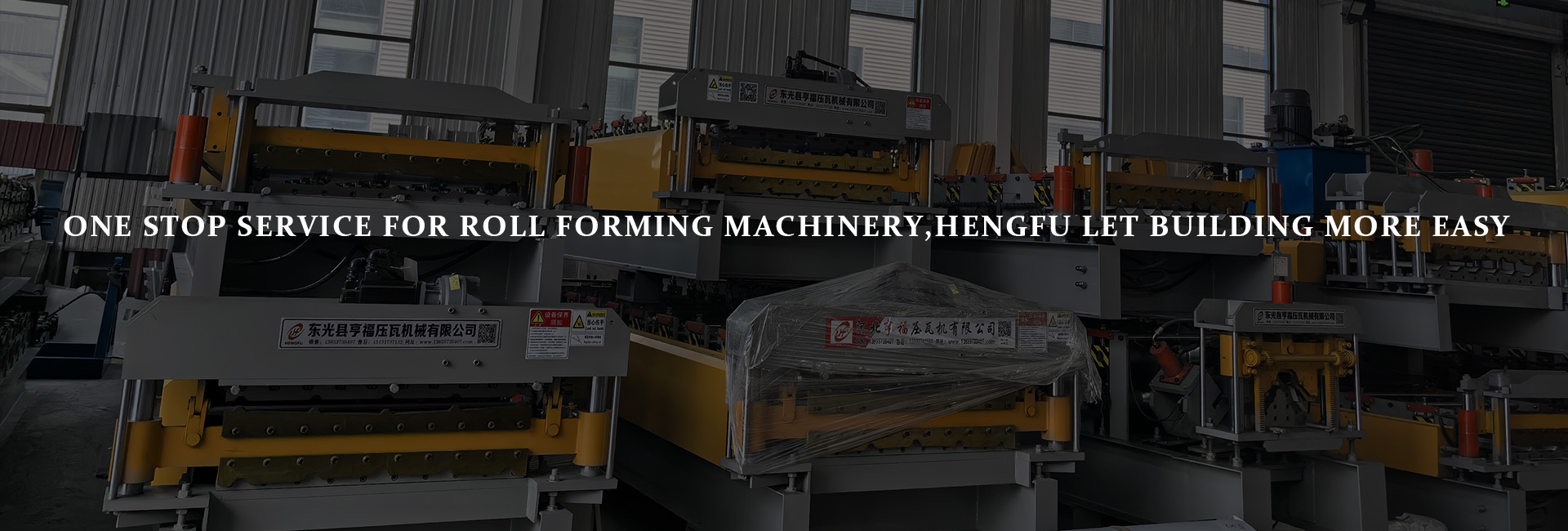Roof Panel Forming Machine Temperature Control for Precision
writer:优化 release time:2025-10-25 18:28:29 Views:156frequency
In high-efficiency sheet metal production, the Roof Panel Forming Machine plays a critical role in achieving consistent and precise output. Among the various performance factors, temperature management often goes unnoticed — yet it directly determines the accuracy, stability, and long-term durability of both the machine and the panels it produces.
During long production runs, friction, hydraulic pressure, and continuous roller motion cause heat accumulation. If not properly controlled, this temperature rise leads to dimensional drift, roller wear, and even product defects. Experienced Chinese manufacturers highlight that maintaining thermal balance is essential for achieving uniform profiles and extending the service life of forming equipment.


1. The Importance of Temperature Stability
Temperature fluctuations affect roller precision, hydraulic consistency, and material response.
A minor increase in heat can expand steel components, disrupt roller gaps, and distort the forming geometry. Similarly, overheated hydraulic oil loses viscosity, reducing control accuracy.
Stable temperature means stable forming — a non-negotiable requirement for high-end roof panel production.
2. Common Sources of Heat in Roof Panel Forming Machines
To manage temperature effectively, operators must first recognize the major heat contributors:
·Roller-to-sheet friction: Continuous contact during forming generates localized heating.
·Motor and gearbox load: Prolonged drive operation increases internal system temperature.
·Hydraulic circuits: The constant oil pressure raises heat within valves and cylinders.
·Workshop environment: Poor ventilation further intensifies overall heat buildup.
By continuously monitoring these sources, operators can act before any heat-related distortion or efficiency loss occurs.
3. Effective Cooling and Temperature Regulation Methods
Factories in China that mass-produce Roof Panel Forming Machines have implemented several reliable temperature control strategies:
(a) Direct Roller Cooling
Air or liquid cooling channels around the rollers help maintain constant forming temperatures and prevent sticking or uneven forming.
(b) High-Performance Lubrication
Using heat-resistant synthetic lubricants minimizes surface friction, controls temperature rise, and prolongs roller lifespan.
(c) Hydraulic System Cooling
External oil coolers or circulation fans maintain oil viscosity and prevent system overheating, ensuring stable forming pressure.
(d) Ambient Air Management
Installing air curtains or cooling ducts near forming lines helps balance workshop temperature and reduce heat stress on machines.
4. Advanced Monitoring for Precision Forming
Modern Roof Panel Forming Machines now integrate intelligent temperature and vibration sensors.
These sensors track key data points, including:
·Roller surface temperature
·Motor heat levels
·Oil temperature and pressure
·Forming line speed vs. heat buildup
Linked to a PLC control system, this data allows automatic adjustments to roller speed, lubrication flow, or fan power — keeping every forming pass precise, even during 24-hour production.
5. Managing Thermal Expansion and Profile Deformation
Thermal expansion is one of the leading causes of dimensional inconsistency in continuous forming. To reduce its impact:
·Allow controlled warm-up before full-speed production.
·Maintain balanced cooling between top and bottom rollers.
·Recalibrate alignment periodically during long shifts.
These preventive steps minimize roller misalignment and protect the mechanical structure from stress fatigue, keeping the Roof Panel Forming Machine running with millimeter-level precision.
6. Maintenance Routine for Temperature Control Systems
Consistent inspection and cleaning are vital.
·Daily: Remove metal debris, check cooling and lubrication lines.
·Weekly: Verify oil levels, clean filters, and inspect seals.
·Monthly: Flush the hydraulic system and confirm temperature sensor accuracy.
·Quarterly: Conduct full calibration and inspect roller parallelism.
A disciplined routine ensures stable production, better efficiency, and reduced unplanned downtime.
7. Selecting Reliable Chinese Manufacturers for Supply
Choosing a dependable Chinese Roof Panel Forming Machine factory offers clear advantages — not just in cost but also in customization and after-sales support.
Factories with bulk manufacturing capacity typically provide:
·Tailor-made cooling configurations for specific metals or climates.
·Integrated monitoring systems linked to digital dashboards.
·Full documentation and operator training.
·Long-term spare part availability.
This makes Chinese suppliers a preferred choice for global buyers seeking reliability and consistent quality in high-volume metal forming.
8. Future Innovations: Smart Thermal Control
The next generation of forming lines is evolving toward automated temperature optimization.
By combining IoT technology with predictive analytics, machines can forecast thermal shifts and automatically adjust forming parameters.
This ensures steady product quality while reducing operator intervention — a major leap toward smart manufacturing in the roll forming industry.
Conclusion
Consistent temperature management is fundamental to achieving high precision and durability in Roof Panel Forming Machines.
Whether through enhanced lubrication, integrated cooling, or intelligent sensors, maintaining a stable forming temperature directly improves panel accuracy and extends machine longevity.
By collaborating with an experienced Chinese factory that offers bulk machine supply and custom engineering, manufacturers can secure equipment designed for reliability, efficiency, and cost-effective production.
Ultimately, controlling heat means controlling quality — and a well-balanced Roof Panel Forming Machine ensures every panel meets exact standards of performance and precision.
References
GB/T 7714:Zou J F, Ma L F, Zhang G H, et al. Controlling roll temperature by fluid-solid coupled heat transfer[J]. Chinese Journal of Mechanical Engineering, 2018, 31(1): 93.
MLA:Zou, Jing-Feng, et al. "Controlling roll temperature by fluid-solid coupled heat transfer." Chinese Journal of Mechanical Engineering 31.1 (2018): 93.
APA:Zou, J. F., Ma, L. F., Zhang, G. H., Huang, Z. Q., Lin, J. B., & Liu, P. T. (2018). Controlling roll temperature by fluid-solid coupled heat transfer. Chinese Journal of Mechanical Engineering, 31(1), 93.







